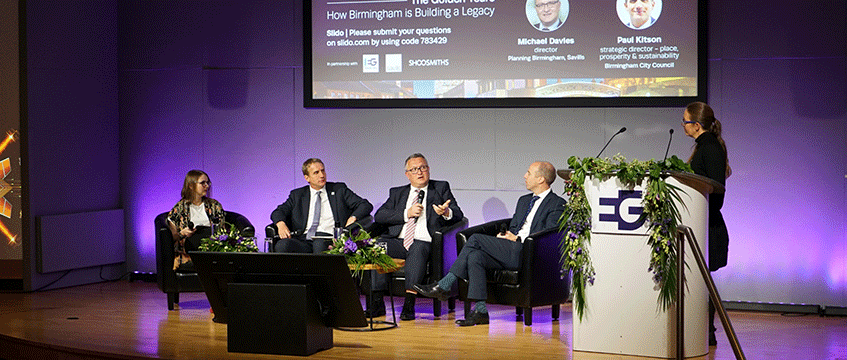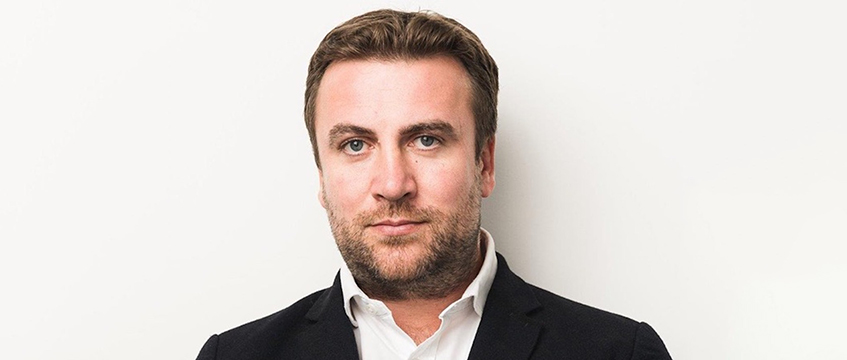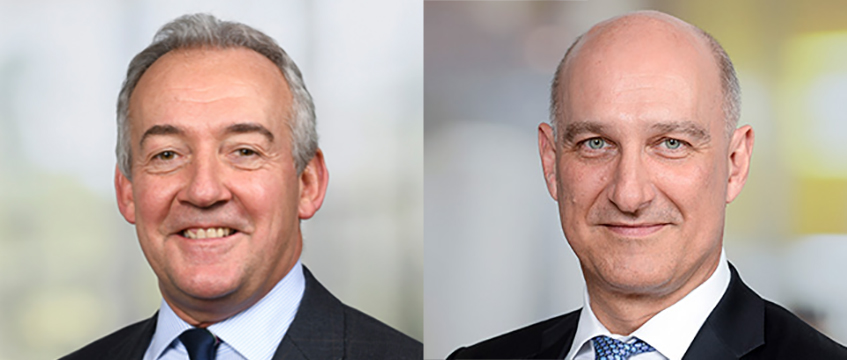EG Cities Live: Unlocking Birmingham’s golden opportunity
Excitement is growing for the Commonwealth Games and with it the buzz around new economic opportunities, regeneration, and the drive to pull in more global investment to bolster the legacy of Birmingham 2022.
For Henrietta Brealey, chief executive of Greater Birmingham Chamber of Commerce, it presents a huge post-Brexit, post-pandemic opportunity to “go out into the world, into key Commonwealth markets, to lure investors, using the games as the catalyst”.
That work – part of the business and tourism programme – is being spearheaded by the West Midlands Growth Company on behalf of the West Midlands Combined Authority, alongside the Department for International Trade and Visit Britain.
Excitement is growing for the Commonwealth Games and with it the buzz around new economic opportunities, regeneration, and the drive to pull in more global investment to bolster the legacy of Birmingham 2022.
For Henrietta Brealey, chief executive of Greater Birmingham Chamber of Commerce, it presents a huge post-Brexit, post-pandemic opportunity to “go out into the world, into key Commonwealth markets, to lure investors, using the games as the catalyst”.
That work – part of the business and tourism programme – is being spearheaded by the West Midlands Growth Company on behalf of the West Midlands Combined Authority, alongside the Department for International Trade and Visit Britain.
“We are only in the first year of a three-year programme,” said Brealey. “It’s going to be a key part of the legacy, continuing to build on those relationships and building those pipelines of investment. Things don’t happen overnight, but the games are a brilliant ‘in’ for building those relationships.”
Speaking at the EG Cities Live event, held last month at Birmingham’s Institution of Engineering and Technology, Brealey said the programme would be bringing key stakeholders from Commonwealth members Canada and Australia to the region over the coming months to talk to local businesses.
“There is a lot to be excited about,” she said, including a push on skills for young people.
But how can stakeholders make sure that every part of Birmingham – including its “left-behind places” – prospers in the aftermath of the games taking place this summer?
Paul Kitson, strategy director for place, prosperity and sustainability at Birmingham City Council, is setting the bar high. “The city will not succeed as a place and we will have failed as a council, we will all have failed, if we don’t ensure a more equitable distribution of that wealth,” he said.
“Those areas of the city where it’s still one of the poorest parts of Europe, where we have still got some of the worst health inequalities in Europe, unequal access to employment opportunities and so on – those things need to be sorted out and that will only come about if you plan strategically and think strategically.”
Sense of pride
In short, “big problems require big thinking, big partnerships”.
A prime example of that “big thinking” is the council’s East Birmingham Inclusive Growth Strategy, which was adopted last year. The area this covers is around a quarter of the city, from Curzon Street in the centre to the boundary with Solihull in the east. It is home to around 230,000 people, of which a third are under the age of 16, and stands to benefit from HS2 and, hopefully, the now-delayed extension of Birmingham’s metro network to north Solihull.
“There are some fantastic real estate and commercial opportunities and some really profound social problems and the work we are doing there is bringing all active partners around the table and developing interrelated improvement plans,” Kitson said.
“We will increasingly be calling on partners to help us with that work. I think it’s really important for us as a place to get that right,” he said.
For Shoosmiths partner Tim Flight, the work done on preparing the city for the Commonwealth Games is already delivering regeneration across the whole of Birmingham.
“Pride in the city has really taken off, with some fantastic design of public realm and places for people to go and enjoy and to congregate. Paradise is a prime example. You walk through that square and you do feel proud. You see the tradition and the historic architecture mixed with the modern and cutting edge. And I think that sums up Birmingham pretty well,” said Flight.
He added: “The Commonwealth Games will accelerate this. It is bringing connectivity to Perry Bar, to Smethwick and creating these hubs of excellence around the city… and all of a sudden, the regeneration is not just the city, it is all parts of the city.”
Planning specialist Michael Davies, a director in Savills Birmingham office, couldn’t agree more. He is a firm believer in the city’s ability to get things right.
The transformation delivered at the key arrival points of Snow Hill and Birmingham New Street, with the adjacent Grand Central shopping centre and tram stop, prove his point. Crucially, infrastructure investment is continuing – into the tram line (West Midlands Metro) and the redevelopment of Perry Barr railway station in the north of the city, for example.
“There are plenty of jigsaw pieces in place. Four or five years ago, they were dotted around the city. Now, that string of pearls is starting to link up. It won’t be long before someone can jump on a tram at the edge of the city and travel into the centre and back out the other side,” he said.
“For me, that connectivity, that arrival piece when you come to Birmingham is dramatically different to how it was five to seven years ago.”
We’ve come a long way
The key challenge for the real estate sector, he says, is to get the message out to investors about how far Birmingham has travelled. Blue-chip occupiers including HSBC, Goldman Sachs and Deutsche Bank have already migrated to the city in the past few years, and the Levelling Up white paper has vowed to move central government departments, including HMRC and DWP, to the West Midlands. But global investors have perhaps been slower to recognise Birmingham’s appeal.
“Trying to persuade people to step out of London or the South East or to persuade international investment houses to come to Birmingham and invest, whether it’s yen, pound or dollar, has been difficult,” Davies said.
The hope is that Birmingham 2022 will be instrumental in changing that.
“These games will put us on the world stage and people will be able to see either from the TV or from arriving here how attractive and how successful Birmingham is,” Davies said.
The experts
Henrietta Brealey, chief executive, Greater Birmingham Chamber of Commerce
Michael Davies, director, planning, Savills
Paul Kitson, strategy director, place, prosperity & sustainability, Birmingham City Council
Tim Flight, partner, Shoosmiths
To send feedback, e-mail julia.cahill@eg.co.uk or tweet @EGJuliaC or @EGPropertyNews
Image: Dan Harvey
In partnership with











